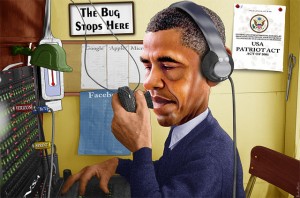Congress passes expansion of surveillance without a warrant or oversight
Congress passed a bill which gives unprecedented legal authority to the government’s warrantless surveillance powers and data collection by the NSA, expanding powers to the executive branch.
Critics say that the fact that this important piece of legislation was handled in this way indicates that this was done intentionally to sneak it past the public eye. Many are also suspicious when you realize that it was done concurrently with the CIA torture report being released and the Gruber hearing.

photo Donkeyhotey [email protected]
The 47-page intelligence bill was headed toward a voice vote when Justin Amash rose to the House floor to ask for a roll call. Despite his efforts—which included a “Dear Colleague” letter sent to all members of the House urging a no vote—the bill passed 325-100, with 55 Democrats and 45 Republicans opposing.
Amash led efforts to block passage of the Intelligence Authorization Act, which will fund intelligence agencies for the next fiscal year. The Michigan Republican sounded alarms over recently amended language in the package that he said will for the first time give congressional backing to a controversial Reagan-era decree granting broad surveillance authority to the president.
The provision in question is “one of the most egregious sections of law I’ve encountered during my time as a representative,” Amash wrote on his Facebook page. He warned that the provision “grants the executive branch virtually unlimited access to the communications of every American.”
“Supporters of Sec. 309 claim that the provision actually reins in the executive branch’s power to retain Americans’ private communications. It is true that Sec. 309 includes exceedingly weak limits on the executive’s retention of Americans’ communications. With many exceptions, the provision requires the executive to dispose of Americans’ communications within five years of acquiring them—although, as HPSCI admits, the executive branch already follows procedures along these lines,” Amash wrote.
“The provisions in the intel authorization appear to be an attempt by Congress to place statutory restrictions on the retention of information collected under Executive Order 12333, which is not subject to court oversight, has not been authorized by Congress, and raises serious privacy concerns,” said Neema Giuliani, legislative counsel with the American Civil Liberties Union. “However, these restrictions are far from adequate, contain enormous loopholes, and notably completely exclude the information of non-U.S. persons.”















